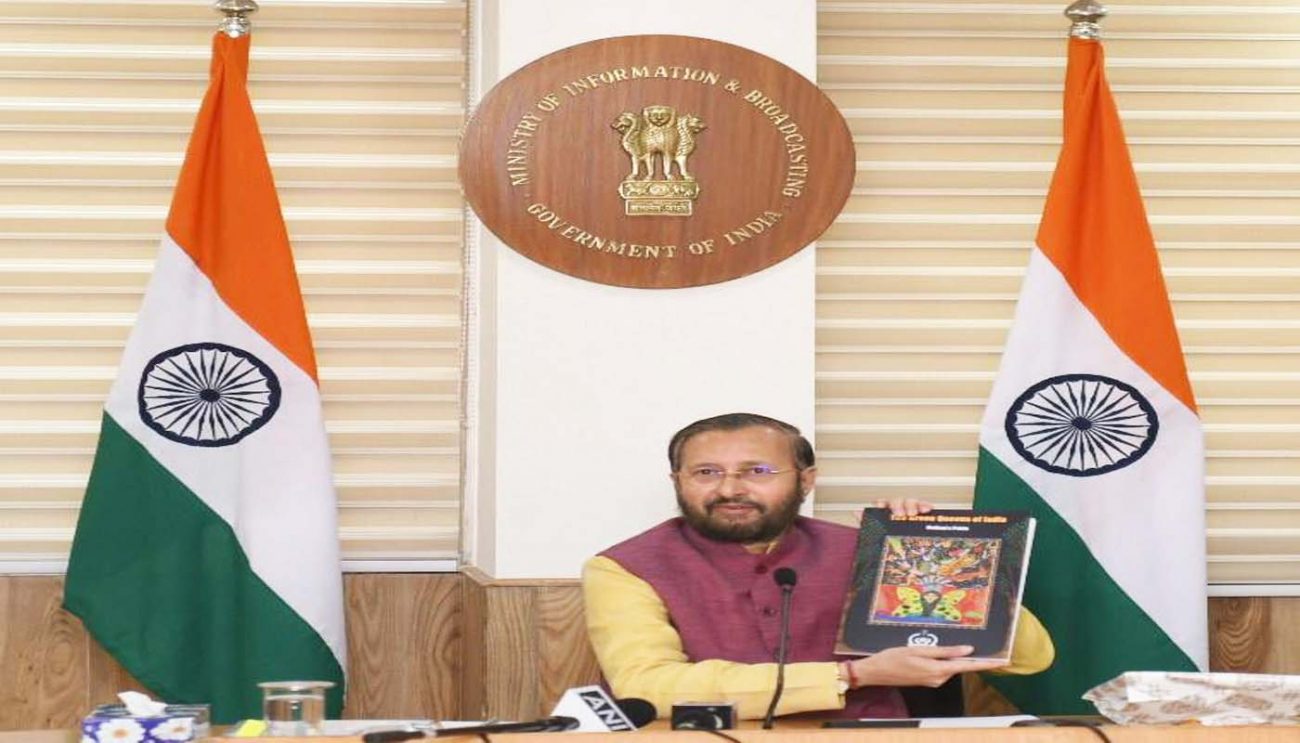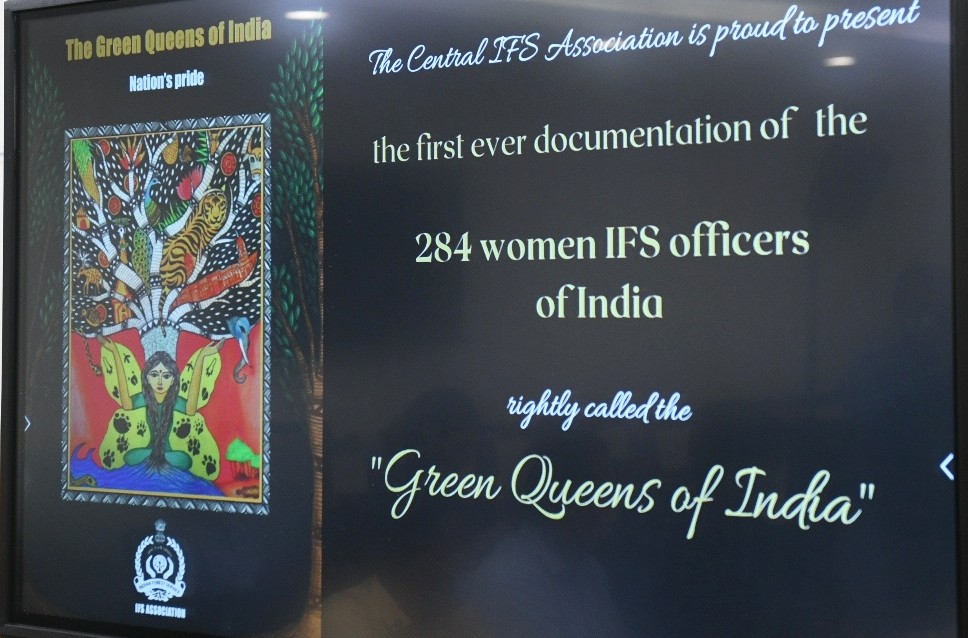Paying tribute to Green Queens, a book for women, by women
Green Queens of India – Nation’s Pride, a book e-launched by Prakash Javadekar on International Women's Day, talks about the role played by women forest officers in protecting forests and wildlife.

By ROOPAK GOSWAMI
Guwahati, March 9: Many tales of trials and tribulations and success stories of women officers have gone untold over time. But thanks to Green Queens of India – Nation’s Pride, many unsung heroines will get their share of fame and recognition.
Among other things, did you know that Deepa D. Nair, 2001 batch, Tripura Cadre, has the unique distinction of having made a mark in the field of film development in Kerala. This microbiologist turned forest officer is a prolific writer featuring in prestigious Malayalam publications.
That is not all. Dimpi Bora, a 2012 Batch, Assam-Meghalaya, in her first posting with the Nagaon Social forestry Division, renovated an ecotourism park with the support of the women members of the local Joint Forest Management Committee.

Green Queens of India – Nation’s Pride
All these, the trials and tribulations and little success stories of women officers that have made a difference have been brought out in the public domain for the first time.
For the first time a book, Green Queens of India – Nation’s Pride, talks about the role played by women forest officers in protecting forests and wildlife.
The book was e-launched by Prakash Javadekar today on the occasion of International Women’s Day.
It was brought out by the Indian Forest Service Association, Central unit, New Delhi.
It talks about what it means to be a lady forest officer and how they are venturing into new frontiers.
Javadekar speaks of conservation success stories
Union forest, environment and climate change minister Prakash Javadekar says the conservation story of India’s forest and wildlife is incomplete without the mention of the proactive role played by women in protecting them.
“I personally recollect my visit to the remote village and conservation of Amur Falcons in Nagaland. This happened with people’s participation especially the local tribal youth and women. They have been a significant force in preserving our country’s forest and wildlife and striving for a greener future,” he said.
“The Green Queens of India – Nation’s Pride is a compilation of more than 100 case studies/best practises of individual women officers working in the forestry and wildlife sector. It has aimed to document their trial and tribulations and their own little success stories that have made a difference. Besides it is entirely spoken from the heart!” Sonali Ghosh, an Assam cadre IFS officer, who is at present DIG at Central Zoo Authority, told NewsFileOnline.
Tribute to women IFS officers
From three women IFS officers who were inducted in 1980, the cadre strength of women IFS officers has grown to over 250 serving officers today.
“It is expected that the e-book will help in effective documentation of scalable case studies, incentivise and further motivate the young brigade and also motivate scores of young women across the country who aspire to live and work with nature as an IFS officer,” she said.
Story of daring Davinder Suman
The book talks of a daring forest officer Davinder Suman, DFO (Batch: 2012, Cadre: Assam-Meghalaya) .
“While booking offences, many were claiming that they were unaware of the legal punishment for unauthorised entry into reserve forests. So she thought of sensitizing the neighbouring community about the necessity of protecting and conserving the forest and wildlife and the punishment for violating the law of the land. This was done through bilingual oral announcements made in Assamese and English by mounting loudspeakers in department vehicles, covering every habitation in the vicinity of reserve forests,” the book says.
“This has brought tremendous impact as witnessed by the drastic fall in the number of persons collecting firewood through head-loads and cycle-loads from next day onwards, ensuring forest protection,” it adds.
Photos, paintings, poetry and book design and writing entirely by women
“Photos, paintings, poetry and book design and writing entirely done by the women officers themselves purely through crowdsourcing techniques. No public funds whatsoever were used to write and design this book,” she said.
The epilogue says thanks to proactive efforts of the government, lady forest officers are contributing to all the levels.
“It is this rise in their numbers at the higher echelons that has triggered a positive cascade at all levels, especially at the level of the forest guard, which in many ways is the face of the forest department at the grassroots level. It is this change which turned out to be a gamechanger in ensuring the gender balance in the service,” it said.
Case study of R. Sobha
It cites the case study of R. Sobha, who, when she took over the post of Head of the Forest Force, Telangana, built toilet complexes and comfort rooms for women even in the remotest forest areas to ensure basic facilities for her frontline staff.
Even a young trainee officer like Madhumitha first addressed the basic amenities that gave a certain dignity and therefore pride in the work assigned to the forest frontline.
The book says lady officers are better placed to understand and address the organic relation between rural India and forestry.
“They are better placed in terms of communication as far as rural women are considered. Women officers, therefore, are effective in communicating both ways: the perceptions of the government as well as people regarding the developmental projects,” it says.
” More than 40 years into the service, lady officers are now in positions of both policymaking as well as implementation. Yet, less than 10% of the IFS officers are women. In many states, a woman officer getting posted in remote places is still a big news,” the book adds.
“When a woman heads the office in a forest department, in a way the society expects her to be more perfect. Even a slightest mistake is blown out of proportion based on the stereotypes the society and the department has held for long. As for the forest service, one thing is clear: that it is not a 10am to 5pm job; but rather a 24*7 on-call duty. Since most of the forest-related offenses happen at night, the call can come at literally anytime. This makes the work-life balance tough for any lady officer. The challenges exist, but so do opportunities in this era of climate change and pandemics,” it says.


